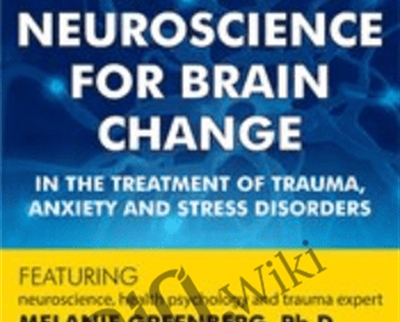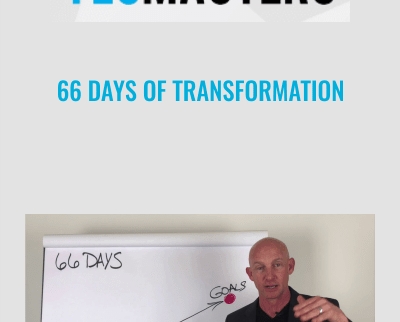2-Day Applied Neuroscience for Brain Change in the Treatment of Trauma, Anxiety and Stress Disorders – Melanie Greenberg
Original price was: $299.99.$87.00Current price is: $87.00.
2-Day Applied Neuroscience for Brain Change in the Treatment of Trauma, Anxiety and Stress Disorders – Melanie Greenberg Download. This certificate trainin…
Salepage link: At HERE. Archive:
This certificate training program will help you master applying neuroscience in your clinical practice – transforming clients’ lives and improving your clinical skills.
Few trainings can offer you the following taught by skilled trainer and clinician, Melanie Greenberg, PhD:
- Apply proven brain-based and mindfulness strategies for treating anxiety, GAD, depression, PTSD and help clients handle major life events and chronic stressors
- Teach clients stress resilience skills like positive focus, growth mindset, engaging mind and body, and mental toughness
- Motivate clients and calm the brain’s stress response using the power of neuroplasticity
- Increase client engagement by focusing on changing the brain not just reducing symptoms
Advances in neuroscience and health psychology, positive psychology, and mindful self-compassion provide us with new tools to energize, strengthen, and update our approach to therapy.
Melanie began incorporating these brain- and strengths-based techniques 5 years ago and they have transformed her practice – making therapy more dynamic and interesting and creating more hopeful, engaged, and empowered clients.
When clients understand that they can actually rewire their brains by practicing new ways of thinking and behaving, they feel less stigmatized and stuck and more motivated to tolerate discomfort in order to change. With these new techniques, we can help clients overcome helplessness, avoidance, and rigid negative self-views and instead develop a growth mindset that helps them overcome the constraints of the past and rebuild their inner and outer worlds for increased happiness and success.
- Determine the neurophysiology of the stress response, including the roles of the amygdala, hypothalamus, sympathetic and parasympathetic nervous systems, and the effects of cortisol and adrenaline.
- Discriminate among acute stress, major life events and chronic stressors, and the longer-term effects of chronic stress on mind and body.
- Implement grounding strategies to help clients who experience “freeze” states or dissociative symptoms.
- Communicate the concept of mindfulness, how it affects the brain, and how to use mindfulness-based interventions in therapy.
- Critique the concept of self-compassion and research on its benefits.
- Design practical exercises to increase self-compassion in clients facing stress.
- Analyze the importance of perceived control to the impact of stressors and learn how to help clients differentiate controllable and uncontrollable aspects of stressors.
- Explore how stress and anxiety narrow cognitive focus and create thinking traps and learn techniques to help clients be more cognitively flexible in the face of stress.
- Evaluate the research suggesting that positive emotions can undo the physiological effects of negative emotions.
- Investigate how rumination exacerbates the effects of stress and how to help clients curtail ruminative cycles and de-fuse from negative thinking.
- Appraise how a growth mindset differs from a fixed mindset and how to help clients adopt a growth mindset and a gritty attitude towards their stressors.
- Assess the application of a brain-based, neuroscience approach to treating clinical disorders like GAD and PTSD.
Get 2-Day Applied Neuroscience for Brain Change in the Treatment of Trauma, Anxiety and Stress Disorders of author Melanie Greenberg only price 119$
Using Neuroscience in Treatment of Stress and Trauma
- Positives:
- Science gives authority, evidence, de-stigmatizes mental health problems
- Increased motivation and hope for change
- Concerns:
- Oversimplification, unrealistic expectations, changing state of science, see self as damaged or different
The Promise of Neuroplasticity
- Describe neuroplasticity in everyday language
- Therapy is about creating a new, more resilient brain
- We are changing beings – don’t have to be stuck in rigid views of self
- Teach brain to be less reactive to stress and triggers
- “Rewiring” as a metaphor for change
- Changing “raw,” unprocessed memories to organized narratives
The Brain’s Stress Response
- Historical view – Hans Selye
- The brain’s stress response “fight, flight, freeze”
- The triune brain – reptilian, mammalian, human
- The amygdala and the prefrontal cortex
- How the amygdala “hijacks” the brain into emergency mode
How the Stress Response is Spread Throughout the Body
- Neurotransmitters – Epinephrine, norepinephrine and cortisol
- The HPA axis and role of cortisol
- The sympathetic and parasympathetic nervous systems
- The dorsovagal “freeze” response to unavoidable threat
The Upside and Downside of Stress
- Increased motivation and engagement – “flow”state
- Can create mental toughness and resilience to future stressors
- Inflammatory response to chronic stress
- Stress and health risk behaviors (excess alcohol use, smoking, overeating etc)
- Stress and cellular aging (telomeres)
Traumas – Effects on the Brain
- Cortisol attacks the hippocampus – center of narrative memory
- Amygdala response increases in strength
- Impaired anterior cingulate cortex (ACC) and prefrontal cortical function
- Cortisol halts production of BDNF – fewer new brain cells formed
- Link to depression, anxiety disorders, PTSD
- Cognitive rigidity and inability to take in new information
- Changes in sense of self and dissociation
Long-Term Impact of Adverse Childhood Experiences (ACEs)
- The ACE Study (Kaiser and the CDC)
- Addictive and unhealthy ways of managing anxiety & negative emotions
- Disease, mental health issues, behavioral problems, PTSD
Explaining Neuroscience Concepts to Clients
- Use drawings and images
- Individualize to the type of difficulty (e.g., disengaged vs reactive – different brain areas)
- Redirect vs eliminate
- Help client label & recognize when happening (e.g., freeze, flooding, negative thinking, rigidity, impulsivity)
- Find coping strategies for each type of brain difficulty
Stress-Proofing the Brain – Overview
- Calming the amygdala – Grounding, mindfulness, self-compassion, perceiving control
- Moving forward with the prefrontal cortex – Cognitive reappraisal, priming positive mindsets and, growth focus, health psychology tools
Grounding Strategies for Clients with Trauma or Attachment Injuries
- Yoga, relaxation, breathing, present-moment focus, soothing with the senses, pets, drawing, gardening, walking
- Mental imagery – safe place, boundaries, energetic, times they felt strong/competent
- Left-brain strategies – task focus and engagement
Mindfulness Strategies
- Qualities of mindfulness states – open, nonjudgmental, fluid, deliberate,
- Observing and accepting inner experience (thoughts, feelings, sensations)
- Using the senses to self-regulate
- De-fusing from negative thoughts and self-images
- How mindfulness changes the brain
- Mindfulness practices – breathing, watching thoughts, urge surfing, open awareness
- Application to anxiety, depression, addictions, PTSD
Self-Compassion Strategies
- Self-kindness, common humanity, focus on unmet needs
- Application to depression, anxiety, stress-management, trauma, insecure attachment
- Link to Schema Therapy – healthy adult mode
- Practices – Metta meditation, soften, soothe and allow, dialogues with inner critic
Cognitive Strategies
- How stress and anxiety narrow attention, create cognitive rigidity
- Depression and negative thinking
- PTSD and internalized negative appraisals (helpless, unworthy, unsafe etc.)
- Worry and rumination cycles – link to prefrontal cortex and default mode network
- Why thought suppression doesn’t work
- De-catastrophizing and probability estimation
- Exposure and tolerating negative thoughts
- Using metaphors (monsters on the boat, bouncy ball underwater)
Creating Positive States of Mind to Counter Stress
- How our brains are wired to the negative
- Positive emotions can promote physiological recovery from anxiety and fear
- Reappraising anxiety as excitement
- Gratitude diaries
- Commitment, control, and challenge; growth mindset
Living Healthy in the Face of Stress
- Sleep disturbance – behavioral strategies
- Healthy coping strategies – exercise, meditation, yoga
- Dealing with emotional eating
Here's an overview of the prominent keywords and a list of famous authors:
Business and Sales: Explore business strategies, sales skills, entrepreneurship, and brand-building from authors like Joe Wicks, Jillian Michaels, and Tony Horton.
Sports and Fitness: Enhance athleticism, improve health and fitness with guidance from experts like Shaun T, Kayla Itsines, and Yoga with Adriene.
Personal Development: Develop communication skills, time management, creative thinking, and enhance self-awareness from authors like Gretchen Rubin, Simon Sinek, and Marie Kondo.
Technology and Coding: Learn about artificial intelligence, data analytics, programming, and blockchain technology from thought leaders like Neil deGrasse Tyson, Amy Cuddy, and Malcolm Gladwell.
Lifestyle and Wellness: Discover courses on holistic health, yoga, and healthy living from authors like Elizabeth Gilbert, Bill Nye, and Tracy Anderson.
Art and Creativity: Explore the world of art, creativity, and painting with guidance from renowned artists like Bob Ross and others.
All the courses on WSOlib are led by top authors and experts in their respective fields. Rest assured that the knowledge and skills you acquire are reliable and highly applicable.
Specification: 2-Day Applied Neuroscience for Brain Change in the Treatment of Trauma, Anxiety and Stress Disorders – Melanie Greenberg
|
User Reviews
Only logged in customers who have purchased this product may leave a review.

Original price was: $299.99.$87.00Current price is: $87.00.











There are no reviews yet.